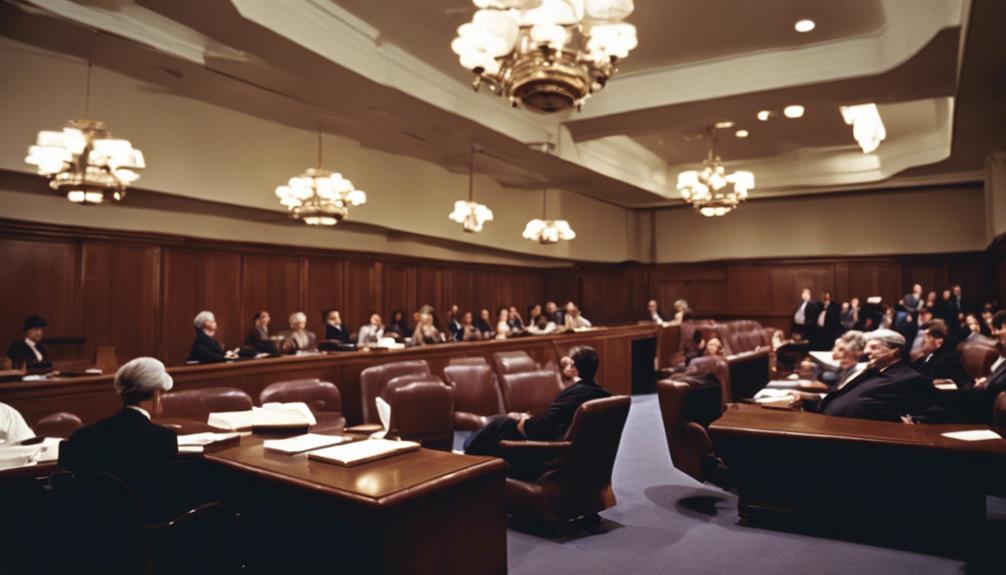Celebrity tax evasion cases have not spared even high-profile individuals like Al Capone, who was convicted in 1931 for five counts of tax evasion, highlighting the severe consequences of neglecting tax duties. Wesley Snipes faced three years in prison for failing to file tax returns, reinforcing the importance of meeting tax obligations. Leona Helmsley's 1989 tax evasion conviction for fraudulent billing underlined the legal implications of such actions. Pete Rose's tax fraud case in the early 1990s revealed the repercussions even for renowned figures. Similarly, Willie Nelson's $16.7 million tax bill led to substantial financial losses. Heidi Fleiss's 37-month prison sentence demonstrated the seriousness of tax evasion and money laundering. Subtle hints suggest further insights into these cases.
Key Takeaways
- Al Capone: Convicted for income tax evasion, served 9 years in prison, highlighting severity and enforcement of tax crimes.
- Wesley Snipes: Jailed for 3 years for tax evasion, emphasizing celebrities' obligation to fulfill tax duties.
- Leona Helmsley: Imprisoned for tax evasion, infamous quote fueled public outrage, stressing importance of tax compliance.
- Pete Rose: Pleaded guilty to tax fraud, faced jail time, showing legal consequences despite his baseball legacy.
- Willie Nelson: Faced $16.7 million tax bill, IRS seized property, revenue-sharing agreement reached, highlighting severe financial repercussions.
Al Capone's Tax Evasion Conviction
Al Capone's 1931 conviction for five counts of income tax evasion marked a significant turning point in the federal government's pursuit of the notorious gangster. Despite his attempts to evade taxes, Capone's personal income tax returns failed to reflect his true earnings from illegal activities. The Internal Revenue Service (IRS) meticulously uncovered his deceit, leading to a case where Capone pleaded guilty to tax evasion.
As a consequence, he served nine years in prison, emphasizing the severe penalties associated with tax crimes. This landmark case highlighted the government's commitment to enforcing tax laws, even against high-profile individuals like Capone. The successful prosecution of Capone for tax evasion underscored the importance of upholding the integrity of the tax system and demonstrated that no one is above the law when it comes to fulfilling their tax obligations.
Wesley Snipes: From Blade to Prison

Wesley Snipes, known for portraying the vampire hunter Blade, faced significant legal troubles when he was found guilty of failing to file tax returns, resulting in a 3-year prison sentence.
Despite his attempts to argue against paying taxes based on constitutional grounds, Snipes was unable to evade the consequences of his actions.
This case serves as a stark reminder that even high-profile celebrities aren't exempt from fulfilling their tax obligations.
Snipes' Tax Conviction
Convicted in 2008 on three counts of failing to file a tax return, Wesley Snipes was sentenced to 3 years in prison for his tax evasion charges. Despite his success as the 'Blade' actor, Snipes faced serious repercussions for his tax evasion. During the trial, Snipes' defense invoked constitutional protection from taxes, but the appeal against the charges was unsuccessful. This case shed light on the legal consequences of failing to file taxes, especially for high-profile individuals like Snipes. The incident served as a stark reminder that even celebrities are not above the law when it comes to tax obligations.
| Keywords | Description |
|---|---|
| Wesley Snipes | Actor involved in tax evasion |
| Tax evasion | Convicted for failing to file taxes |
| Failing to file | Charges against Snipes |
| Prison time | 3-year sentence for tax evasion |
| Legal consequences | Highlighted through Snipes' case |
Implications and Sentencing
Shifting from a renowned actor to a prison inmate, Wesley Snipes faced a stark reality following his conviction for tax evasion in 2008. After being found guilty in a federal court on three counts of failing to file his income tax returns, Snipes was sentenced to three years in prison, despite his claims of constitutional protection from taxes. His unsuccessful appeal further solidified the legal consequences of his actions.
This high-profile celebrity tax evasion case serves as a poignant reminder of the repercussions individuals face when attempting to evade their tax obligations. Wesley Snipes' journey from a successful actor to a convict underscores the seriousness of tax evasion charges, even for well-known personalities. The case also highlights the importance of upholding tax laws and the consequences that follow when individuals, regardless of their status, fail to comply with their legal duties regarding income tax.
Leona Helmsley's Tax Troubles

Leona Helmsley, the billionaire hotel operator known as 'The Queen of Mean,' faced legal troubles when she was convicted of tax evasion in 1989, leading to an 18-month prison sentence.
Her infamous statement, 'Only the little people pay taxes,' contributed to the public's perception of her lavish lifestyle and disdain for tax obligations.
Despite the aftermath of her legal battles, Helmsley's public image remained tarnished by her high-profile tax evasion case.
Helmsley's Lavish Lifestyle
Helmsley's opulent lifestyle and tax troubles captured widespread attention during her high-profile tax evasion case in 1989. Known as the 'Queen of Mean,' Leona Helmsley was convicted of tax evasion for fraudulently billing personal expenses to evade taxes. This led to her serving 18 months in federal prison.
Her infamous quote, 'Only the little people pay taxes,' further fueled public outrage during the case. Despite her lavish lifestyle and vast real estate empire, Helmsley faced legal consequences and reported to prison on the income tax deadline day in 1992.
This case highlighted the critical importance of tax compliance and the severe repercussions individuals, even high-profile ones, face when attempting to evade taxes through fraudulent practices. The saga of Leona Helmsley serves as a stark reminder that no one is above the law when it comes to tax evasion, emphasizing the need for transparency and honesty in financial dealings.
Legal Battles Aftermath
What were the repercussions of Leona Helmsley's tax evasion conviction on her real estate empire and public image?
Leona Helmsley, a prominent figure in the real estate industry, faced legal consequences for failing to pay taxes, leading to a tax evasion conviction. Despite her wealth and status, she spent 18 months in prison for her tax crimes, which tarnished her public image.
The aftermath of her legal battles included:
- Serving time in federal prison for tax evasion.
- Being labeled 'The Queen of Mean' due to her conviction.
- Highlighting the importance of tax compliance for all individuals.
- Facing consequences despite her belief that 'only the little people pay taxes.'
- Impacting her successful real estate career and overshadowing her achievements.
These events shed light on the significance of upholding tax laws regardless of one's social standing, emphasizing the repercussions that can arise from non-compliance with tax regulations.
Public Image Impact
The billionaire hotel operator's tax evasion conviction in 1989 greatly harmed her public image. Leona Helmsley, known for her wealth and status, faced consequences for her actions when she was found guilty of tax evasion and subsequently spent 18 months in federal prison. Throughout her legal troubles, Helmsley earned the notorious nickname 'The Queen of Mean,' further tarnishing her reputation.
Her infamous quote, 'Only the little people pay taxes,' added fuel to the fire of public scrutiny. Despite her previous image as a successful hotel operator, her involvement in tax crimes had a lasting impact on how she was perceived by the public. The case highlighted the significant repercussions that even individuals of high status could face when engaging in illegal activities such as tax evasion.
This incident serves as a stark reminder that no one is above the law, regardless of their wealth or social standing.
Pete Rose's Gambling and Tax Woes

During the early 1990s, Pete Rose's involvement in gambling and tax evasion led to significant legal repercussions, including a six-month jail sentence for filing false income tax returns. Despite his baseball legacy, Rose faced legal consequences for tax fraud and evasion. The IRS investigation revealed discrepancies in his reported income, shedding light on his financial discrepancies.
- Pete Rose pleaded guilty to filing false income tax returns, leading to a 6-month jail sentence in 1990-1991.
- He failed to report income from memorabilia sales and ran afoul of the IRS in the early 1990s.
- Rose's tax evasion case was separate from his ban from baseball due to gambling on games.
- The IRS investigation into Rose's finances revealed discrepancies in his reported income.
- Despite his baseball legacy, Pete Rose faced legal consequences for tax fraud and evasion.
Willie Nelson's IRS Battle

Willie Nelson's confrontation with the IRS over a staggering $16.7 million tax bill in the late 1980s led to drastic measures to resolve his financial troubles. The IRS eventually reduced the tax bill to $6 million, but in 1990, nearly all of Nelson's property was seized by the IRS due to non-payment. This seizure left Nelson in a dire financial situation.
To address his tax issues, Willie Nelson entered into a revenue-sharing agreement with the IRS. The IRS's investigation into Nelson's taxes had severe financial consequences, resulting in further property seizures. Ultimately, Nelson had to negotiate a settlement with the IRS to alleviate his tax burden.
This high-profile case serves as a stark reminder of the importance of fulfilling tax obligations to avoid such drastic repercussions. Nelson's experience highlights the significant impact that tax evasion can have on a celebrity's financial stability and reputation.
Heidi Fleiss: The Hollywood Madam's Tax Issues

Heidi Fleiss, the Hollywood Madam, faced significant legal repercussions for tax evasion and money laundering, underscoring the serious consequences of failing to meet tax obligations. Despite her notoriety in the entertainment industry, Fleiss was held accountable for her illegal financial activities. The case of Heidi Fleiss serves as a stark reminder of the repercussions individuals may face when engaging in criminal tax practices.
- Fleiss had to pay back taxes and fines as part of resolving her tax issues.
- She received a 37-month prison sentence for her tax evasion and other criminal activities.
- The consequences of failing to pay taxes and participating in money laundering were highlighted through Fleiss's case.
- Heidi Fleiss's situation emphasized the importance of complying with tax laws, regardless of one's public image.
- The Hollywood Madam's legal troubles shed light on the seriousness of engaging in illegal financial activities within the context of tax evasion.
Frequently Asked Questions
Who Is the Most Famous Tax Evasion Case?
Al Capone stands as the most famous tax evasion case in history. His 1931 conviction for failing to pay $215,000 in taxes marked a pivotal moment. Capone's ties to illegal activities like bootlegging and murder, with annual earnings of $100 million, led to an 11-year prison sentence.
This case showcased the federal government's successful prosecution against him, leaving a lasting legacy in the annals of tax evasion history.
Who Is a Celebrity That Committed Tax Evasion?
Heather Locklear, an acclaimed actress, was found guilty of committing tax evasion. She failed to report a significant portion of her income, resulting in legal consequences.
Locklear's case serves as a reminder that even high-profile individuals can face scrutiny for failing to fulfill their tax obligations. The repercussions of such actions can be severe, highlighting the importance of compliance with tax laws to avoid legal troubles.
What Actor Got in Trouble for Tax Evasion?
Wesley Snipes, the actor, faced trouble for tax evasion by failing to file federal income tax returns for multiple years. His case involved complex legal proceedings and significant financial penalties.
Although acquitted of felony charges, Snipes was found guilty of misdemeanors and sentenced to three years in prison.
This high-profile celebrity's tax evasion case serves as a notable example of the legal consequences individuals may face for tax crimes.
What Is the Highest Penalty for Tax Evasion?
The highest penalty for tax evasion can reach up to $100,000 for individuals and $500,000 for corporations. In addition to financial penalties, individuals could face imprisonment for up to 5 years, while corporations might receive up to 10 years.
The IRS may also impose a penalty of up to 75% of the tax underpayment for intentional evasion. Seizure of assets and liens on property are other potential consequences individuals may face for tax evasion.
Conclusion
To sum up, celebrity tax evasion cases serve as cautionary tales of the consequences that can arise from failing to comply with tax laws. Just like a spider weaving a web of deceit, these high-profile individuals found themselves entangled in legal troubles due to their evasion tactics.
It's clear that the IRS doesn't discriminate based on fame or fortune, holding everyone accountable for their tax responsibilities. As these cases demonstrate, attempting to evade taxes can lead to serious repercussions, regardless of one's status in society.










